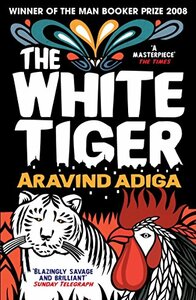You need to sign in or sign up before continuing.
Take a photo of a barcode or cover
dark
funny
mysterious
reflective
tense
slow-paced
Plot or Character Driven:
A mix
Strong character development:
No
Loveable characters:
No
Diverse cast of characters:
No
Flaws of characters a main focus:
Yes
"Here's a strange fact: murder a man, and you feel responsible for his life—possessive, even. You know more about him than his father and mother; they knew his fetus, but you know his corpse. Only you can complete the story of his life; only you know why his body has to be pushed into the fire before its time, and why his toes curl up and fight for another hour on earth."
HOLY FUCK.
HOLY FUCK.
Not being an Indian exonerates me from getting personal on this book as, quite deliberately, Adiga has composed a provocative text not merely due to its explicit content but the blunt linguistic style too.
The whole novel is framed as a long letter written by our protagonist, the infamous White Tiger, Balram, to the then Chinese Premier Mr Wen Jiabao. As the two most populated countries in the world, the Indian society that Adiga depicts in his work is presided over by all the human darkness that you can come up with - toxic masculinity, social Darwinism, populistic democracy, structural violence, etc, all of which big words that researchers, quite naturally, craze for. Yet, such is the Indian reality - an extreme form of capitalism that reduces humanity to a cog in the machine. This, certainly, is already nothing new to the current readership.
What surprises me the most, however, is the masculinity that fuels Balram's actions. This is one of those books that leaves little room for emotions to sink in: emotive descriptions are minimal as they are largely replaced by actions after actions in which stark class struggle is presented. It is not difficult for more mature readers to accept Balram's obsession of ascending into another social class - we are all corrupted, in a sense, by a world that is not hugely different from Adiga's literary creation. What should strike the most is the amorality - a keen negligence of the time-honoured code of any society - that pervades the novel. If the cost of success, in the mundane sense, is what we understand as morality, to be successful basically means the letting go of humanity.
Which I don't think only happens in Adiga's India.
The whole novel is framed as a long letter written by our protagonist, the infamous White Tiger, Balram, to the then Chinese Premier Mr Wen Jiabao. As the two most populated countries in the world, the Indian society that Adiga depicts in his work is presided over by all the human darkness that you can come up with - toxic masculinity, social Darwinism, populistic democracy, structural violence, etc, all of which big words that researchers, quite naturally, craze for. Yet, such is the Indian reality - an extreme form of capitalism that reduces humanity to a cog in the machine. This, certainly, is already nothing new to the current readership.
What surprises me the most, however, is the masculinity that fuels Balram's actions. This is one of those books that leaves little room for emotions to sink in: emotive descriptions are minimal as they are largely replaced by actions after actions in which stark class struggle is presented. It is not difficult for more mature readers to accept Balram's obsession of ascending into another social class - we are all corrupted, in a sense, by a world that is not hugely different from Adiga's literary creation. What should strike the most is the amorality - a keen negligence of the time-honoured code of any society - that pervades the novel. If the cost of success, in the mundane sense, is what we understand as morality, to be successful basically means the letting go of humanity.
Which I don't think only happens in Adiga's India.
dark
funny
medium-paced
Plot or Character Driven:
Plot
Strong character development:
Complicated
Loveable characters:
No
Flaws of characters a main focus:
Yes
This book was actually very interesting and engaging I just HATED the characters, which was totally the point. This was my first ever book club book and the other people didn't really love it but I thought it was interesting and very informative about the caste system in India. I really enjoyed Balram's perspective and seeing what he went through and how it shaped him and how the whole society is shaped. Definitely kept me on my toes, not sure exactly why it was written in letter form but I didn't mind. Overall a very interesting read.
dark
emotional
adventurous
challenging
dark
funny
fast-paced
Plot or Character Driven:
Character
Strong character development:
Yes
Loveable characters:
No
Diverse cast of characters:
Yes
Flaws of characters a main focus:
Yes
Dark humor. I see a lot of parallels with Indonesia...that sometimes we have to do atrocious things because that's the only way we can get out of the "system" or the "cage".
challenging
dark
sad
medium-paced
Plot or Character Driven:
A mix
Strong character development:
Yes
Loveable characters:
Complicated
Flaws of characters a main focus:
Yes
adventurous
dark
funny
mysterious
reflective
tense
medium-paced
Plot or Character Driven:
A mix
Strong character development:
No
Loveable characters:
No
Diverse cast of characters:
Complicated
Flaws of characters a main focus:
Yes




